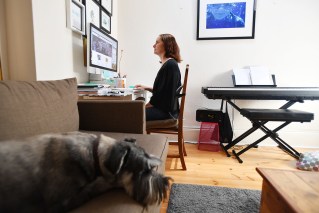How coronavirus will change the way Australians work


The way Australians work has been fundamentally altered. Photo: Getty
Australian workplaces have taken drastic actions to mitigate the effects of the coronavirus pandemic, and researchers say some of those changes will stay indefinitely.
The deadly disease has closed down public spaces, including stores and offices, with research from Roy Morgan suggesting as many as 1.4 million Australians were forced out of work in the latter half of March alone.
A further 3.8 million have had their hours reduced, and 2.7 million have been stood down until restrictions are eased.
Fortunately, the shutdown of communal spaces hasn’t forced everyone out of work, however, with estimates from Roy Morgan suggesting 9 per cent of the workforce has instead found ways to work from home.
It’s a dramatic shift in the way Australians work, one that Roy Morgan chief executive Michele Levine said was once considered impossible by employers.
But with working-from-home technology becoming “mainstream” within the space of only a few weeks, Ms Levine said employers have to accept remote working is a functional means of running a business.
“I think this will change the way people see working from home, I absolutely do,” she told The New Daily.
“Many people have been using these things for a long time but many haven’t, so I think it will be a little bit like the first time you put your credit card details into the internet.
“At first you think to yourself ‘What am I doing? How brave am I?’ But then you do it, and all of a sudden you’re buying things online every day.”
Much like an enthusiastic shopper increasingly buying goods online, Ms Levine said employees too will likely ask to work from home far more regularly after the pandemic passes – and employers will have fewer reasons to say no.
Remote work brings new challenges
The possibility for businesses to work remotely opens up a range of options for employers and employees.
Workers can be sourced from cities other than the one an employer is headquartered in, and entrepreneurs can theoretically begin operating without the added overheads associated with renting commercial property, for example.
But as with all changes, there will be challenges, Ms Levine said, chiefly among them the need to manage different staff, with different preferences for where they work and different motivations.
That view was shared by Keti Malkoski, principal of people and culture consulting with property group Schiavello.
Speaking to The New Daily, Ms Malkoski said Australia will see the rise of a “different kind of leadership” that can better handle the “flexible behaviours” of employees.
“This reduced visibility that will occur during the recovery process will mean we need resilient leaders that are very empathetic and adaptable to change,” Ms Malkoski said.
“There’ll be a greater emphasis on the type of leadership that’s required to engage the workforce differently and in a more flexible way.”
Offices are here to stay
Despite the likelihood that remote working will become more regular and acceptable, Ms Malkoski said physical office spaces will remain a staple of work life in Australia.
And the reason these corporate bastions will still be present is a simple, human need: The need for social connectivity, Ms Malkoski said.
“When we return [to the office] we will sit further apart and there will be staged groups coming in, and we’ll have that physical distance,” she said.
“But that social connectivity side will prevail, that really human side of work.”









